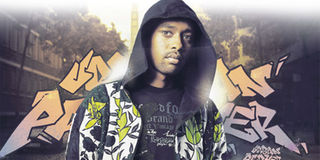Rigga

FACT BOX: Rigga. Real Name: Charles Righa. Age: 26 (Born September 14th 1987). Church: Mavuno Church – Belle Vue (South C, Nairobi)
BONIFACE MWALII sought out 2013 Groove Awards nominee Rigga to establish his whereabouts over the last few years and what his ‘Album Of The Year’ nominated record is all about. Here’s what he had to say.
You have been under the radar for a while now, what exactly have you been up to?
I had been attending to my academic commitments. While I wasn’t actively engaged in music, I was able to attain my Law degree from the University of Nairobi and also get my accreditation from the Kenya School of Law. But all the while, my love for music and art never died. I was still quietly writing and recording for my most recent album release.
Are you now a practicing lawyer?
Lawyer, yes! Practising, not quite. I am due for admission to the Bar very soon but I’m currently focusing all my energy towards my music ministry career.
You know how they say lawyers are unscrupulous and crafty? How does this fit in with your religious background?
Many lawyers live up to the negative stereotype but I must also say that I have interacted with, and served under, lawyers who share and practice the faith, uphold justice and are excellent in all what they do. These lawyers have shown me that you don’t have to “play dirty” to get ahead in life. One can successfully be a lawyer and uphold their religious beliefs.
What drove you to do gospel hip hop and not secular music like most other hip hop acts?
I believe that music is a platform to communicate. I’ve always wanted to say something that matters and to be true to who I am. Fortunately, my faith preceded my love for music. Doing gospel hip hop was where God steered my heart when I began to love and grow in music.
My first recorded (radio) release in early 2005 featured Kayvo K-Force, Adniq and myself. It was produced by Babz of Underdawg Records. It was about showcasing our abilities and love for hip hop (not a gospel song).
But that’s not where my heart was. When I told the rest of the crew that I had decided to do Christian music, they allowed me to follow my passion. It was a smooth transition and I’ve been doing it ever since.
Your last album received five Groove Award nominations in 2009. How would you rate its success in the market?
I thank God for my first album “The Awakening.” I’d say it was a success because some of the songs on that album took on a life of their own. The music, though very Christian in content, crossed over to places I never thought it would. I had the opportunity to promote the album both locally and abroad. And receiving reports about how the music impacted lives was overwhelming.
Being my first record, I made a few mistakes, which has given me the opportunity to learn a thing or two about promotion, music business and artistry. Things that I’m doing a lot better with this album.
And your album Urban Prayers has been nominated for Album of the Year in the 2013 Groove Awards…
Yes, I’m most grateful and excited about that. It’s a blessing to have both my first and second album nominated for Album of the Year at the Groove Awards. It was a huge collaborative effort bringing it to life. Shout out to the lead producer Jaaz Odongo and the entire Urban Prayers team.
What inspired the single ‘Sina Chorus’?
Sina Chorus is about the legitimate fears faced when trying to make it in life. What will I eat? What will I wear? Where will I live? And how will I make it? I don’t know what the future holds but I can direct my questions to the one who is responsible for holding my future.
Even with the uncertainties of life, I recall all the times God has come through for me and that it’s because of Him that I’m even here. The song is about thanksgiving and contentment, even in the face of uncertainty. I wrote it for myself and the countless people who can relate.
Your style has shifted dramatically from flowing English to a mixture of English and Swahili. What prompted this?
Language is a communication tool. The language choice will be driven by the intended audience. Urban Prayers, like my first album, has songs entirely in English, in Swahili/Sheng and many songs that are a mix. This is who I am. The cosmopolitan kid with cultural influences, both domestic and foreign.
Would you consider your career as a gospel artiste successful thus far?
I’m very thankful for all that God has enabled me to accomplish thus far but honestly, I feel like my story is only just beginning. Let’s see what lies ahead.
Which personalities in the gospel music fraternity do you look up to as an artiste?
Locally, I admire the life stories of my predecessors: Pete Odera, Jack Odongo, Kanjii Mbugua, Rufftone, SK Blue & Dj Moz because these are all veterans who have positively impacted generations. We are one big family and I have lots of love and respect for my brothers and sisters. From Juliani, Astar, Eko Dydda, Kris Eeh Baba, Neema Ntalel, Kambua, Daddy Owen…the list is endless.
What are your future plans musically?
My priority at the moment is promoting Urban Prayers locally, regionally and continentally. Hopefully this will open doors for event opportunities both in Kenya and the rest of Africa. There will definitely be a couple more single releases from the album so look out for those.




